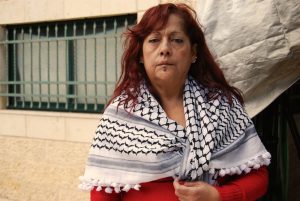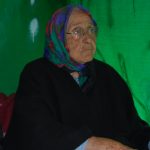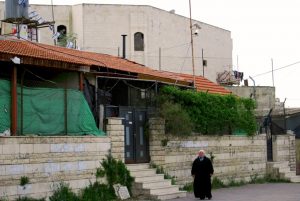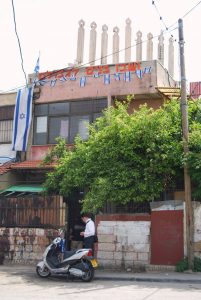Maisa Al Kurd and Hawla Hanoun: two women of Sheikh Jarrah
Hannah Brooks
Last week I went to interview some women living in Sheikh Jarrah. The journey to Jerusalem from Ramallah was uneventful and we drove through the Hizma checkpoint without being stopped or checked along with Israelis living in settlements who use the checkpoint to commute into Jerusalem. West Bank Palestinians who have permits to go into Jerusalem can’t use Hizma and have to travel through Qalandiya.
Sheikh Jarrah streets are lined with beautiful old houses, a little shabby or worse for wear now, with former orchards of fruit and olive trees overgrown and tired alongside smart hotels, restaurants and Consulates and Representative Offices to the Palestinian Authority, including the British Consulate. The faded grandeur belies the intense struggle of some of the areas residents against eviction by Israeli courts, evictions which have been called “an impediment” to the peace process by the US State Department and “unacceptable” by the EU.
I talked to two women affected by the fight : Maisa Al Kurd who is still in her home and Hawla Hanoun who was evicted with her extended family from her home last August. Maisa’s home is opposite one now inhabited by Israeli settlers and festooned with Israeli flags. A group of settlers were hanging around on the street outside. As we walked through the gate to Maisa’s house, I could see that the front section was sealed off. We had to walk through a tent to get to the entrance. Maisa, a vibrant woman with dyed red hair wearing leggings and a long jumper welcomed us. The house is usually shared with her two sons, her elderly mother, her brother and his family in what is a smallish one-storey building. They fled here from Haifa in 1948 where they owned two hotels as well as property. As part of an agreement between the Jordanian government and the United Nations Relief and Works Agency (UNRWA) they were allocated this house, which Maisa was born in and which the family still (just) lives in.
She explains the front part of the house has been locked up since 2000, when legal proceedings were brought against her family for building the small extension without a permit (which are almost impossible for Palestinians to obtain). It had been built so that her brother, his wife and their two children could have more space. The Court imposed a substantial fine, sealed the extension to the house and took possession of the keys ordering that the family could not use the renovated rooms. The final decision is pending, but thousands of dollars have been spent by the family on court fees and fines. Meanwhile, a well funded settler organisation, Nahalat Shimon International (NSI), has requested a further eviction order from the court to remove the family from the remainder of the home they have lived in since 1956.
The court ordered the extension to be locked up pending a final decision, but this has not kept the settlers from trying to enter the property. Maisa described to us in painstaking detail a morning in November last year. One of the settlers appeared at her door and casually asked: “Whose furniture is that?” When she ran around to the front of the house, she saw a group of about 60 settlers at the front of her home. Having broken into the front they, were now busy throwing out the small bits of furniture that had been left in the extension. This was despite a court decision ordering that no one should occupy the property. This was not a one off – Maisa described several other attempts by the settlers to break into the extension and added: “Every day we have trouble from the settlers. They are like gangsters. They stand in the street and say bad words at us and throw stones and garbage at us and at the house. They are constantly there, harassing and abusing us.”
The day we visited, a couple of the settlers casually strolled through the gate and into the front garden. There is no friendly intent here. They were trying to intimidate the Palestinian residents and feel that they can act with complete impunity and with the protection of the Israeli authorities. While Maisa’s sons and other young men from the area have been arrested, settlers go unpunished with complaints by Palestinians ignored or disbelieved. Complaints by international observers seem to have more weight with the Israeli police, especially when accompanied by video footage. When a 60 year old British woman working for the EAPPI program was attacked by settlers throwing rocks and bottles in Sheikh Jarrah, a complaint to the police resulted in four of the settlers involved in the attack being banned from the area for a month. (You can read more about the incident and see a video of the attack at the EAPPI site.)
Hawla Hanoun, who has four children between the ages of 8 and 21 years, told us of similar experiences with the settlers: “The settlers throw stones at us and call the police and make accusations against us … They call us ‘prostitutes’ and ‘thieves’ and shout ‘We want to transport you to Jordan’.” Later I was taking a picture of Hawla outside her former home, one of the settlers approached me and said up close to my face, in broken English – “Get away – I’ll break your camera.”
In August 2009, Hawla lost the home she had lived in since she married in 1986, and where she raised her four children.
Now she sees the settlers coming and going from the house that they have decorated with the Israeli flag as she sits on the street with members of family, neighbours and international and Israeli solidarity activists protesting the loss of her home.
The night of the eviction was traumatic.
“I was up for most of the night and it was only at 4.30am that I put my head down to get some sleep. It was only moments afterwards when I heard shouting and screaming and the sounds of glass breaking and I knew what was happening. Suddenly I saw five soldiers standing over me screaming and shouting, I was half asleep and couldn’t respond straight away to what I was seeing although I had been prepared…. The soldiers didn’t let me put my slippers on and they were pushing and punching me all over as I was getting over – it felt like I was at the front line of a war. The soldiers were wearing black uniforms and had masks on their faces and then gas masks over the top of them. I fled from the house, and was shouting ‘where is my husband? Where are my children?’.”
NSI has applied for permission to build 200 new residential units where the Palestinian families now live. Effectively a wealthy property company wants to develop prime real estate at the expense of vulnerable tenants. The story is one familiar to me as a legal aid lawyer in the UK defending people in similar situations. In Sheikh Jarrah it’s complicated by the fact that this is occupied land and there are political and religious interests at work. Here, there is an explosive and probably unstoppable combination of business interests and ideological fervour, that fits in with political objectives that include securing and maintaining demographic and geographic control over occupied East Jerusalem in order to consolidate Israel’s claim to sovereignty over the occupied city. Former Jerusalem mayor Uri Lupolisanski described actions in Sheikh Jarrah, as a way “to strengthen the connection between the Jewish neighbourhoods…” Knesset member Benny Elon spoke of “our strategic plan for the city – a belt of Jewish continuity from east to West.” Local Israeli courts hearing these cases act as facilitators of this process and can hardly be the forum for resolving these disputes. As the UN Special Co-ordinator for the Middle East Process pointed out “the United Nations rejects Israel’s claims that [the evictions] are a matter for municipal authorities and domestic courts.” If on the other hand, the courts are going to apply the law equally to all the citizens in Jerusalem then as Ze’ev Sternhell pointed out in Haaretz in April: “There are Palestinians, among them those who live in East Jerusalem, who have title deeds to homes in Talbieh, Old Katamon, Baka, and other neighborhoods in the western part of the city” who should equally be entitled to claim ownership of these properties.
Lives of Palestinian families have been turned upside down by the vicious determination of settler organisations supported by the Israeli state and facilitated by the courts. These strong and determined women have to find a way to manage the personal consequences for them and their families, as well as resist what they see as a larger process to move the Palestinians out of Sheikh Jarrah and East Jerusalem. As Hawla told me: “I am 46 years old and the mother of three children. Before this happened I was a housewife and not political but now I feel strong; that I have an inner strength from claiming back my rights. But I still feel weak in front of my children when my son blames me for we’re going through and asks me ‘when, when are we going back home?’ and I’m unable to answer him.”




